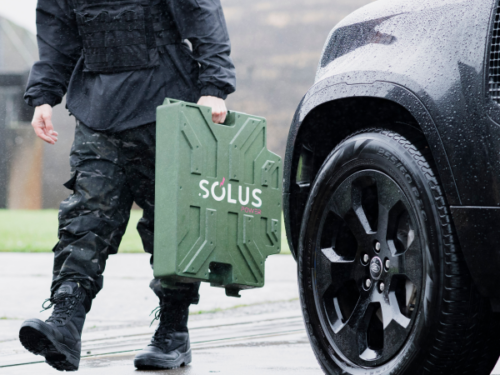Solus Power, the UK fast battery charging specialist, and the global QinetiQ Group, the former British Defence and Evaluation Agency, have signed a Memorandum of Understanding regarding research and development of advanced EV charging solutions adapted to the fast-evolving electrified military landscape.
Kratos is the name of a robust off-the-grid modular rapid charging and energy storage system developed by Solus Power. It contains a portable battery pack, the size of an attaché case, that provides ultra-fast charging. The ruggedised lithium-ion power units, described as ‘Jerry Cans of electricity’, can deliver ultrafast charging to the likes of electric vehicles, drones, or equipment. Kratos is designed to be placed under a car or stacked, providing users with the ability to adjust to energy demands. Users can scale the number of packs to increase capacity depending on their energy needs.
QinetiQ has been working with customers in the defence and security industry. The company has a profound understanding of the existing challenges, threats, and opportunities. One such challenge is how to flexibly charge EVs across diverse locations and infrastructural settings.
The collaboration between the two companies sees QinetiQ supporting Solus Power to understand the needs of defence and security customers globally, in addition to providing their expertise in power sources and electrification.
Stas Leonidou, CEO, Solus Power, said: “Solus Power welcomes the opportunity recognised in this MOU to collaborate with an organisation of QinetiQ’s standing and experience in the defence sector.”
Victoria Doherty, Head of Electrification, QinetiQ, said: “Enabling the flexibility to provide electric power wherever and whenever it is needed underpins future operational advantage. By working across sectors to transfer existing solutions, we will accelerate success in this area.”
QinetiQ is active in many commercial, defence and academic networks, including collaboration with organisations such as Johnson Matthey, Fraunhofer Institute, DLR (Germany), Centrosolar, and SINTEF.












